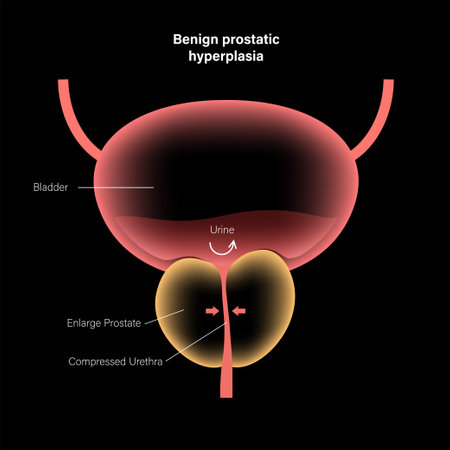Prostate Problems - Symptoms, Causes, Prevention & Homeopathic treatment

Overview
The prostate is a small, walnut-sized gland located below the bladder and in front of the rectum in men. It plays a crucial role in the reproductive system by producing a component of semen. Prostate problems are common, especially as men age, and can range from benign conditions like benign prostatic hyperplasia (BPH) to more serious issues such as prostate cancer. Understanding these conditions, their symptoms, and treatment options is essential for effective management and patient care.
Symptoms
Prostate problems can present with a variety of symptoms, which may include:
- Frequent Urination: Especially noticeable at night (nocturia).
- Urgency: A sudden and strong urge to urinate.
- Difficulty Starting Urination: Trouble initiating the flow of urine.
- Weak Urine Stream: Reduced force or flow of urine.
- Painful Urination: Discomfort or pain during urination.
- Painful Ejaculation: Discomfort or pain during ejaculation.
- Pelvic Pain: Pain or discomfort in the lower abdomen or pelvic area.
- Blood in Urine or Semen: Hematuria (blood in urine) or hematospermia (blood in semen).
When to See a Doctor
Consult a healthcare provider if you experience:
- Persistent Symptoms: Symptoms that do not improve or worsen over time.
- Severe Pain: Significant discomfort or pain in the pelvic area.
- Difficulty Urinating: Trouble starting or maintaining urination.
- Blood in Urine or Semen: Visible blood, which could indicate a serious condition.
- Unexplained Weight Loss: Sudden or unexplained weight loss, which may be associated with cancer.
- Family History: A history of prostate problems or prostate cancer in the family.
Early consultation can help in accurate diagnosis and timely intervention.
Causes
Prostate problems can arise from various causes:
- Benign Prostatic Hyperplasia (BPH): Non-cancerous enlargement of the prostate due to aging and hormonal changes.
- Prostatitis: Inflammation of the prostate gland, which can be caused by bacterial infections or other factors.
- Prostate Cancer: Malignant growth in the prostate gland, often linked to genetic and environmental factors.
- Hormonal Changes: Fluctuations in hormone levels, particularly testosterone and dihydrotestosterone, can affect prostate health.
Risk Factors
Several factors can increase the risk of developing prostate problems:
- Age: Risk increases with age, particularly after 50.
- Family History: A family history of prostate problems or prostate cancer.
- Genetics: Certain genetic mutations or hereditary conditions.
- Ethnicity: Higher incidence in African American men compared to other ethnic groups.
- Hormonal Changes: Imbalances in testosterone and other hormones.
Complications
Prostate problems can lead to several complications:
- Urinary Tract Infections (UTIs): Resulting from urinary obstruction or retention.
- Bladder Damage: Chronic obstruction can cause bladder damage or dysfunction.
- Kidney Damage: Severe obstruction can lead to kidney damage due to backflow of urine.
- Sexual Dysfunction: Issues with ejaculation or erectile dysfunction.
- Prostate Cancer: If not diagnosed early, it can spread to other parts of the body.
Preventions
Preventing prostate problems involves lifestyle and health management:
- Regular Check-ups: Routine screenings and check-ups, especially if you have a family history.
- Healthy Diet: A diet rich in fruits, vegetables, and healthy fats; low in red meat and processed foods.
- Physical Activity: Regular exercise to maintain a healthy weight and promote overall health.
- Hydration: Adequate fluid intake to support urinary health.
- Limit Alcohol and Caffeine: Reducing intake of alcohol and caffeine can help manage symptoms.
Can Homeopathy Help?
Homeopathy offers a holistic approach to managing prostate problems, focusing on individualized treatment based on the patient’s symptoms and overall health. Some commonly used remedies include:
Homeopathic Remedies for Prostate Problems
- A homeopathic practitioner will select remedies based on a thorough assessment of the patient’s symptoms, constitution, and overall health.
Diagnosis
Diagnosing prostate problems involves several steps:
- Medical History: Comprehensive history of symptoms, previous health issues, and family history.
- Physical Examination: Includes a digital rectal examination (DRE) to assess the size and texture of the prostate.
- Urine Tests: To check for infections, blood, or other abnormalities.
- Blood Tests: PSA (prostate-specific antigen) levels to screen for prostate cancer or other conditions.
- Imaging Studies: Ultrasound, MRI, or CT scans to visualize the prostate and detect any abnormalities.
- Biopsy: If cancer is suspected, a biopsy may be performed to confirm the diagnosis.
Treatments
Treatment for prostate problems varies based on the specific condition and severity.
Lifestyle and Home Remedies
Incorporate lifestyle changes to support prostate health:
- Healthy Diet: Include foods rich in antioxidants, omega-3 fatty acids, and vitamins; avoid excessive fats and processed foods.
- Regular Exercise: Engage in regular physical activity to support overall health and manage weight.
- Hydration: Drink plenty of water to support urinary health and flush out toxins.
- Stress Management: Practice relaxation techniques to manage stress and support overall well-being.
- Avoid Irritants: Reduce or eliminate intake of alcohol, caffeine, and spicy foods that may exacerbate symptoms.
Preparing for Your Appointment
To maximize the effectiveness of your appointment, consider the following:
- Symptom Diary: Keep a record of your symptoms, including frequency, intensity, and any changes.
- Medical History: Provide a detailed history of your health, family history of prostate issues, and previous treatments.
- Test Results: Bring any previous imaging studies, blood tests, or biopsy results.
- Questions: Prepare a list of questions regarding diagnosis, treatment options, and lifestyle changes.
- Support System: Involve family members or caregivers to discuss care strategies and provide support.
